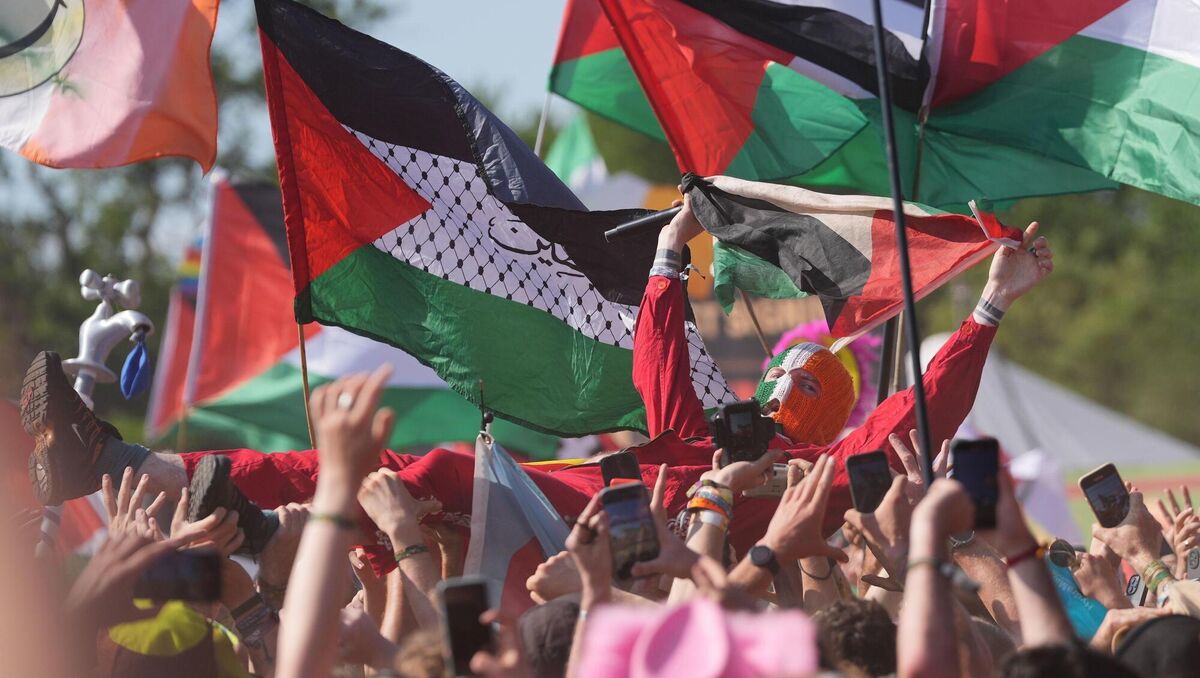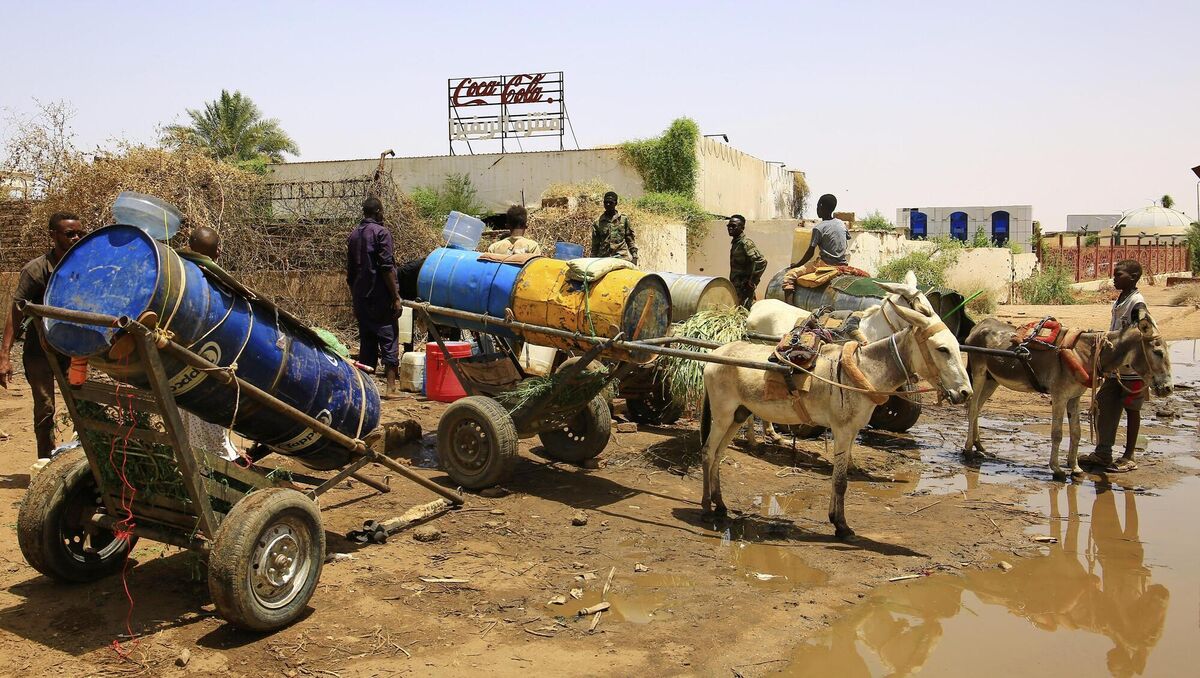Jennifer Horgan: We need to find room in our hearts for the people of Sudan

Refugees in Sudan in a makeshift camp in April; some 3.7m children and women require treatment for acute malnutrition. Picture: AFP via Getty
“Keep love in your heart,” advised Oscar Wilde. “A life without it is like a sunless garden when the flowers are dead.”
Wilde says nothing about capacity, however. I mean, how big is the garden? Can a heart be too full? Occupied. Red not green. Closed not open.
What is the capacity of the human heart?
I remember a woman, pregnant with her second child, worrying that her heart couldn’t love another baby as much as it did her first. She genuinely thought it might burst.
Baby number two arrived, number three, number four — her heart stayed perfectly intact.
It simply expanded to accommodate more love. Does the human heart always have such stretch, I wonder?
Watching Glastonbury, it was hard not to feel my own heart expanding.
For weeks now celebrities have been mobilising. Something is shifting.
There are so many examples: Sally Rooney’s asking how the British government can call campaign group Palestine Action terrorists for breaking into an RAF base and damaging property, when the same day 23 civilians were killed by Israeli forces; Gary Lineker refusing to back down; Bruce Springsteen beginning his Manchester gig by calling his administration “corrupt” and “treasonous”.
The good guys are shining a light on the bad. The oppressed and marginalised, the artists and lovers, are raging back against power, corruption and violence.
It’s good for the heart. Gaza deserves this outpouring. Every human life is precious.
Less consoling is the global reaction to the ongoing horror in Sudan — the famine, the cholera, the sexual violence against girls and women, the brutal violence between two sides in an interminable civil war.
And it is not just Sudan. In Myanmar 22m people are in need of assistance and more than 3.5m are displaced by conflict.
But Sudan is by far the world’s fastest-growing displacement crisis, with an average of 20,000 people migrating daily.
It was labelled a genocide by America in January, the previous genocide ending only 20 years ago.

According to Concern, “30.4m — or three in every five people — need humanitarian assistance there. As of May 2025, between 12m and 14m people have been displaced, and four million have crossed borders into neighbouring countries.”
Some 3.7m children and women require treatment for acute malnutrition.
For the Sudanese, we are not rising, singing, marching, raging. We are exceptionally quiet. It is the worst humanitarian crisis of our times. And it is happening in near silence.
Niamh Griffin travelled to Sudan for eight days earlier in the year for this paper.
Her coverage was exceptional — bringing to readers’ attention the savage reality for the Sudanese people.
She was disappointed with the lack of engagement.
In one of her pieces Niamh Griffin considers the issue head on, suggesting that the story might not appeal to us quite so much.
“It is not a simple war they are fleeing, with obvious good guys and bad guys,” she writes.
Then her question: “Is that why the war lurks behind the headlines in Europe?”
Possibly it is. We simply don’t connect with the story. But people are being attacked, killed, and starved. Millions of people. Shouldn’t we care?
Possibly, we empathise more with victims who are like us. Activists often compare Irish history to the plight of Palestinians.
They remind us that we too were the victims of a ‘great hunger’ that was, as is argued by many, a genocide.
But no — that doesn’t work. The famine in Sudan is no different.
It is a man-made catastrophe, and it is affecting millions of ordinary people who want nothing more than to grow crops, educate their children, and work for a brighter future.
Its roots are also colonial, sprawling from decisions made by the British when they divided the country and left. We are like Sudanese people too.
Perhaps it is that our empathy carries an expiration date. We supported famine victims in Africa already. We have moved on. If the situation in Gaza doesn’t improve, will we simply tire of it and move on again?
Or is it possibly because what happens in Sudan doesn’t really affect Europe?

We are deeply affected by the machine of America and Israel. It is part of our culture. We read the skewed headlines, and we feel the injustice of it in our bones.
It directly impacts us. The fight is wrapped up in the scourge of neoliberalism, the greed of capitalism. We recognise the specific type of power and inhumanity that is starving, killing, and maiming Palestinians.
Powerful men in powerful offices in Israel and America have worked against Palestine for decades. We recognise that oppression, and we have had our fill of it.
This is why the most popular headlines in Ireland are those that reminisce abut our proud legacy of fighting against oppression.
Our fight, shoulder to shoulder with Palestine, and against Israel, is a personal one — we are tired of being duped by the media/money machine, the hateful engine of our modern world.
Sudan’s fight doesn’t belong to us in the same way. Not anymore.
It might have done in 1922 but the mess of our own civil war following independence is a tougher conversation, and so, Sudan fades into insignificance, a footnote. The biggest humanitarian crisis of our time is a footnote.
The Madleen, the brave flotilla that attempted to bring aid to Gaza, picked up four Sudanese refugees on its journey. Shouldn’t the world, or activists in the West, do more?
We are told our country, and the world cannot stand by and allow the ongoing war in Gaza to continue.
It is no longer an option to ignore what’s happening — rightly so.
How is it that we are morally permitted to ignore Sudan?
Plenty has been written about the absence of coverage on Gaza during the 12-day war between Israel and Iran. I see nothing about our sustained silence on Sudan.
Our inattention has consequences.
According to Concern “the 2025 Sudan Humanitarian Needs and Response Plan (HNRP) aimed to reach 21m of the most vulnerable people with life-saving assistance, requiring $4.2bn to do so.
However, as of May 21, only 13.3% of the required funding had been received, according to the Financial Tracking Service.”
In the programme for government the Government of Ireland commits to advocate for greater attention for Sudan; they have raised the issue at EU level, not that most Irish people will have noticed.
People need to push their governments to ensure that humanitarians and humanitarian aid can safely access Sudan (both borders and frontlines) to ensure those in need receive assistance.
Is it, and I ask this with compassion for us all, that we simply don’t have room for it?
Beyond our own families, can we only feel love for one group and one situation at a time?
Do we tend to feel empathy for people most like us? Does the story, the type of oppression, carry more weight than the death toll?
Perhaps the garden of our hearts, as described by Wilde, can only hold so many flowers at once.
Remember the early months of Russia’s attack on Ukraine? I knew people who headed off in trucks to bring supplies. They up and left.
People opened their homes and schools. Yellow and blue flowers and ribbons bedecked our streets and fired our imaginations.
Ukraine being back in the headlines this week reminds us how little attention we’ve offered it lately. We have turned our attention away and filled our hearts with Gaza.
Every action for and about Gaza is warranted. But for whatever reason we have made a choice to not do the same for the people of Sudan. It is a choice worth mentioning.






